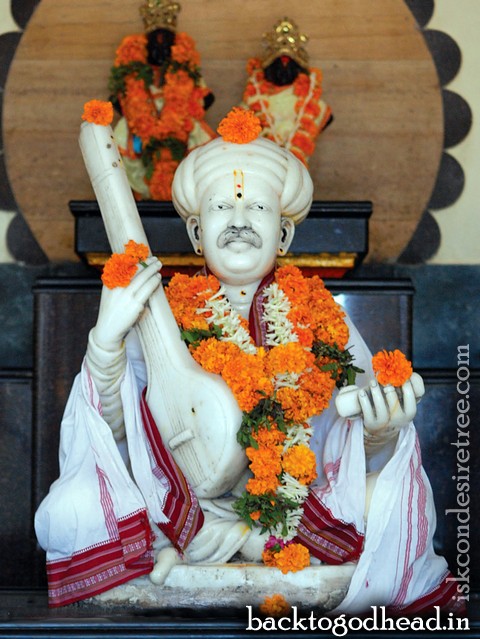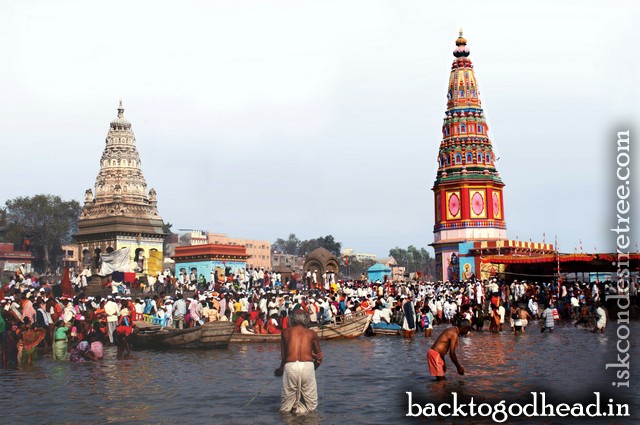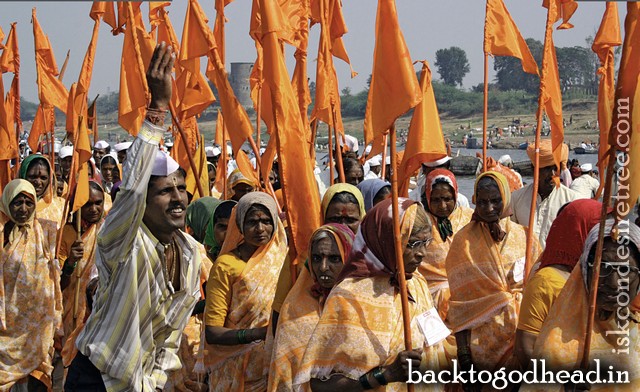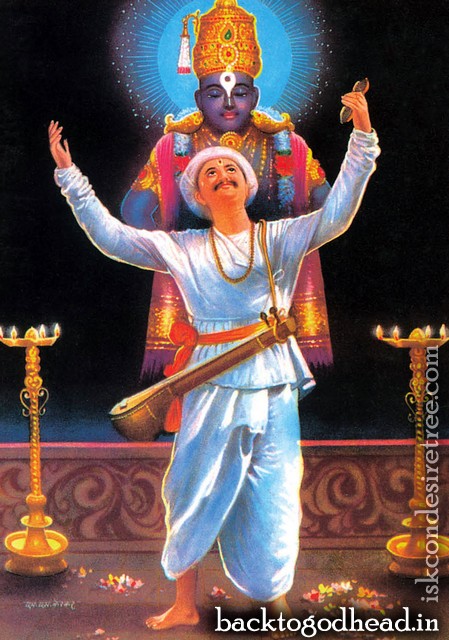Words are the only jewels I possess
Words are the only clothes I wear
Words are the only food that sustains my life
Words are the only wealth I distribute among people Says Tuka, witness the Word, He is God
I worship Him with my words. – Sri Tukarama
Sri Tukarama (CE 1609–1650) was a saint-poet of towering stature, and his pervasive influence in Marathi language, culture, literature, and spirituality is celebrated in thousands of abhangas (devotional poems) throughout the west Indian state of Maharashtra. His followers say that his devotional accomplishments are so colossal that to describe them, many future generations of translators and commentators will have their pens occupied for centuries to come. In a sense, Tukarama is a saint-poet who belongs more to the future than to a specific historically bound past.
Birth and Ancestry

Sri Tukarama was a distinguished devotee of Lord Vitthala (or Vithoba), the Krishna deity worshiped in Pandharpur, Maharashtra. Born in Dehu, a lively village on the banks of the holy river Indrayani, Saint Tukarama was the son of two devotees of Lord Vitthala: Bolhoba and his wife, Kanakai. Dehu, near Pune, is referred to as jagrut sthan, “an abode of live divinity.” For centuries the devoted residents of Maharashtra have sung, “Praise be to the village of Dehu, and praise be to Pandharpur, for Lord Vithoba Himself dwells there.”
Nearly five thousand years before Saint Tukarama was born, when Krishna was the ruler of Dwarka, a pure devotee named Sri Pundalika lived in Pandharpur. During that time, Lord Krishna’s queen Rukminidevi left her palace in Dwarka, as she was upset with Lord Dvarakadhisa (Krishna). She traveled to Pandharpur Forest, and Lord Dvarakadhisa followed her there, both to find her and to see His devotee Pundalika.
On the scenic banks of the Chandrabhaga River, near ISKCON Pandharpur, Pundalika, who was serving his Vaishnava parents, saw the charming Lord Dvarakadhisa resting His lotus hands on His slender waist. Sri Pundalika asked the Lord to wait while he finished his duties. He then offered the Lord a brick to stand on. Thus, Lord Dvarakadhisa became known in Pandharpur as Lord Vitthala, “the Lord who stands on a brick.” The Lord waited by the door for His devotee, with His lotus hands on His eternally curvy hips. Still today, Lord Vitthala stands like this in the Pandharpur temple, waiting for us to come back to Him.
For centuries, millions of devotees have worshiped Lord Vitthala within the ancient Vitthala Mandir in Pandharpur. Rakhumai, as Srimati Rukminidevi is known here, stands faithfully beside Him on her own altar. Garuda, the Lord’s dedicated bird-carrier, stands peacefully with folded hands in front of Lord Vitthala. At the entrance of the temple sits Sri Vighnaraja, or Ganesa.
During the time of Saint Tukarama, Muslims reigned in southern India and were constantly at war with each other. The rulers enjoyed the privileges of stolen royalty while their warriors plundered villages.
In spite of the difficult political situation, Sri Tukarama’s childhood was spent in comfort and luxury. Later his life changed from material prosperity to abject poverty. With great courage, resilience, and unshakable faith in Lord Vitthala, Sri Tukarama faced the death of his parents, wife, and son. After the devastating sorrow of losing his family, he had to endure even further gruelling pangs of material miseries. Still, he remained fixed at the lotus feet of his best friend and almighty protector, Lord Vitthala.
Soon after Sri Tukarama’s parents died, severe drought and famine struck his village. He had to struggle to make ends meet. It was during this calamity that his wife and son died from starvation. These relentless hardships convinced Tukarama of the temporary nature of earthly pursuits. In a mood of quiet prayer, he climbed Bhamgiri Mountain to seek solace from the Lord.
Although attacked by snakes and wild animals, he was determined to stay there until he had found the eternal truth. After fifteen days of seclusion, fervent prayer, and calls for his Lord’s attention, Sri Tukarama received Lord Vitthala’s audience. Pleased by Tukarama’s bhakti, Lord Vitthala bestowed upon him the eternal truth and love of Godhead.
Saint Tukarama has written, “I lived on Bhamgiri Mountain and concentrated all my faculties on Him. Snakes, scorpions, and tigers attacked me; there was trouble everywhere. It was on the fifteenth day that revelation came: I met Vithoba. I was then inspired to versify, and in my mind I put my hands around Lord Vithoba’s feet.”
Initiation
Sri Tukarama states in his abhangas that he received the guru-mantra containing the holy names of Krishna, Rama, and Hari names of God in the maha-mantra: Hare Krishna, Hare Krishna, Krishna Krishna, Hare Hare/ Hare Rama, Hare Rama, Rama Rama, Hare Hare. (Hare is the vocative form of both Hara and Hari.)

Tukarama has revealed through his renowned devotional writings that he received his mantra through the medium of a dream from a divine personality he called “Raghava Caitanya, Keshava Caitanya.” Scholars and historians cite evidence that Saint Tukarama had some mystical con- nection with Caitanya Mahaprabhu. Gaudiya Vaishnavas (followers of Lord Caitanya) believe that Sri Caitanya Mahaprabhu initiated Sri Tukarama by way of this transcendental dream. Srila Prabhupada writes in his introduction to Srimad-Bhagavatam: “Saint Tukarama, after initiation by the Lord, over flooded the whole of the Maharashtra province with the sankirtana movement, and the transcendental flow is still rolling on in the southwestern part of the great Indian peninsula.”
As Sri Tukarama’s meditation on Lord Vitthala became increasingly more profound, he began writing and reciting verses called abhangas, which encapsulated the essence of ancient srutis and sastras. As Srila Prabhupada writes in the foreword to Songs of the Vaishnava acaryas, “Songs composed by the acaryas are not ordinary songs. When chanted by pure Vaishnavas, who follow the rules and regulations of Vaishnava character, they are actually effective in awakening the Krishna consciousness dormant in every living entity.”
Saint Tukarama continuously sang the Lord’s praises in his mother tongue of Marathi, composing over 4,500 abhangas. Many of these are reflections of events in his life, which make them somewhat autobiographical. However, there is an un mistakeable clear focus on Lord Panduranga (Vitthala), Lord of Pandharpur.
Sri Tukarama regularly went on sankirtana pilgrimage from Dehu to Pandharpur, along with thousands of his followers. Along the way he would stop and enlighten the crowds, which would increase from village to village. Always crying out to the Lord with his loving abhangas, Tukarama used his bhakti poetry to encourage everyone to take up a God-centered life.
Sri Tukarama’s public discourses focused on offering one’s daily life as service to the Lord. Tukarama worked for the enlightenment of society and emphasized sankirtana, chanting the Lord’s holy names, rather than ritualistic observances or the mechanical study of the Vedas. Singing, dancing, and playing musical instruments, Saint Tukarama and the crowds he drew would happily walk over two hundred kilometers to Pandharpur.
Srila Prabhupada writes, “Tukarama acarya became very famous in the Maharashtra province, and he spread the sankirtana movement all over the province. The sankirtana party belonging to Tukarama is still very popular in Bombay and throughout the province of Maharashtra, resembling the Gaudiya-Vaishnava sankirtana parties in the chanting of the holy names of the Lord, accompanied by mrdangas and karatalas.” (Caitanya-caritamrta, Madhya-lila, 9.282, Purport)

I once wrote to Srila Prabhupada to report on the progress our traveling sankirtana party was making in Maharashtra. Srila Prabhupada was extremely pleased with the village-to-village tour, which is now an annual festival.
In his reply to my letter, His Divine Grace wrote, “The whole of India and specifically your Maharashtra are enthused with Krishna. Now you have to revive their Krishna consciousness. This is Tukarama’s country, but they are all becoming bad politicians. So, revive them by the process of the sankirtana movement. I am very glad that you are preaching village to village and will cover all of Maharashtra.”
When I was just a small boy, the villagers in Aravede, Maharashtra, where I was born and raised, would hold kirtana all night long on Ekadasis. All the farmers and cowherds would gather together in various homes and sing Tukarama’s abhangas accompanied by karatalas and mrdangas.
I used to sit with them, late into the night, and listen to the melodious bhajanas. Families singing the praises of God together and taking care of the land was an effective formula for simple living, high thinking. (God created the country; man made the mess.)
Although I had not read Bhagavad-gita or Srimad-Bhagavatam, I received the knowledge of the elders through the abhangas. Still today, many villagers, even illiterate ones, memorize and recite Sri Tukarama’s devotional poetry. These verses keep them in Krishna conscious spirits.
Saint Tukarama knew and taught that a human being can never attain happiness if there is no place for God. He wrote, “Look at my experience. I made God my own, and He gave me the answers to my questions whenever and wherever I put them to Him.”
Saint Tukarama was several centuries ahead of his time. With utmost compassion, he anticipated the spiritual anguish of modern man. He would invoke divine love within his audiences, immersing them in deep emotions for God.
Sri Tukarama would sweetly sing, The devotee’s love is like the leash Hari goes wherever He is led We should recite Your name You should give us Your love
His foremost sources of scriptural references were Bhagavad-gita and Srimad-Bhagavatam: gita bhagavat kariti sravana akhanda cintan vithoba ce, “For those who hear and study Bhagavad-gita and Srimad-Bhagavatam, constant remembrance of Vitthala becomes possible.”
Critical Moments In Tukarama’s Life
Several events in Saint Tukarama’s life deeply affected his spiritual writings and teachings. One incident involved a scholar named Ramesvara Bhatta, who was surprised to find the essence of the Bhagavad-gita being presented in the Marathi language with such eloquence. The envious scholar believed that Tukarama’s birth as a non-brahmana disqualified him from elucidating the essence of the Vedas. Tukarama responded: “You might think these are my verses, but no, this is not my own language. Nor is it my own skill; it is God who makes me talk. It was Lord Vithoba Himself who ordered me to versify.”

But Ramesvara Bhatta was not convinced of Sri Tukarama’s purity of heart. Backed by a local militia, he ordered Tukarama to sink his verses in the sacred river Indrayani. Laughing and humiliating Sri Tukarama in public, Ramesvara announced to the crowd that if these devotional works were the outcome of divine order, then Lord Vitthala Himself would save the books from being destroyed.
Tukarama collected all his abhanga books, tied a heavy stone to the bundle, and with full faith tossed his entire collection of bhakti writings into the Indrayani River. One night, thirteen days later, Lord Vitthala, dressed as a child, visited Saint Tukarama. The Lord told him that He had been safeguarding the books underwater and that they would resurface the next day.
Some followers of Sri Tukarama received similar divine messages. Word spread, and the next day a large crowed gathered on the banks of the Indrayani. To the crowd’s astonishment and Ramesvara Bhatta’s dismay, the books were floating on the surface.
With exhuberant excitement and enthusiasm, people retrieved the sacred books which were completely dry and respectfully returned them to Sri Tukarama. His abhangas protected by Lord Vitthala Himself, Tukarama was free to preach, and so he continued with his devotional discourses and kirtana.
Encounter with King Shivajee
Sri Tukarama’s reputation eventually reached King Shivajee, who sent a messenger bearing valuable gifts, such as lamps, horses, and gems. Tukarama politely refused the gifts and responded to the king with four of his abhangas. In one of the verses, Sri Tukarama complained to King Shivajee: “You seem to provide me exactly the things that do not interest me.”
King Shivajee was astounded by Saint Tukarama’s attitude of renunciation. So later, the king decided to travel to Lohgaon, near Dehu, to see Sri Tukarama and seek his saintly association and advice.
When the king presented more gifts, Tukarama said, “What use is this treasure to me; I want only Lord Vithoba. Your gesture shows your generosity, but to me these gifts are like pebbles.”
Sri Tukarama politely asked King Shiva to recite the names of God and become a servant of Lord Vithoba.
Departure of Tukarama
Saint Tukarama’s passing was remarkable. During the night before he left this world, the saintly devotee prepared for his departure by chanting the holy names without stop.

He extended an invitation to his family, friends, and followers who had gathered there: “I am going to Vaikuntha. Come along with me.”
It is said that after Tukarama announced his imminent departure, Sri Garuda landed on the bank of the Indrayani to carry him to the spiritual world.
No one understood Tukarama’s invitation. He affectionately embraced his fourteen intimate followers and his surviving son, named Mahadeva Vithoba.
They all came forward and paid their final respects to Sri Tukarama, who then cast a look at his second wife, Jijabai, and said to all, “Bid farewell to me now and return home. It’s high time I responded to Vithoba’s call in Vaikuntha. Vithoba has been waiting for quite some time now. It’s time for me to leave, and I beseech all for their blessings. Vithoba has come through for me at the end, and Tuka will now disappear.”
Sri Tukarama peacefully proceeded to board Garuda. The huge celestial bird flew to the spiritual sky, leaving behind a scene of hundreds of weeping and grieving devotees. He left this material world in his self-same body, singing the holy names of the Lord, just as Dhruva Maharaja had done in a previous age.
Celebrating Saint Tukarama’s 400th Birth Anniversary
• Celebrations of Tukarama’s 400th birth anniversary began in January 2008 and will culminate in February 2009.
• Celebrations were conducted throughout the world, including conferences and festivals in Boston (USA), Mauritius, and India, especially in Maharashtra. The festivals included plays, discourses on Tukarama’s abhangas, and publications on Saint Tukarama’s life and teachings.
• The 2008 eighteen-day procession from Tukarama’s birthplace to Pandharpur was a historic event, with more than 200,000 participants. As usual during the annual walk, priests carried a pair of Tukarama’s wooden shoes.
• An internationally awardwinning film about Saint Tukarama, produced by ITV, was previewed all over the world and is available for purchase.
ISKCON Pandharpur
ISKCON Pandharpur invites everyone to come and receive the audience of the ever-merciful Lord Vitthala. Srila Prabhupada and the most beautiful Sri Sri Radha- Pandhrinatha are meticulously cared for in the ISKCON temple on the banks of the Chandrabhaga River. The devotees of ISKCON Pandharpur are eager to receive guests in their new guesthouse and to arrange boat rides across the sacred Chandrabhaga River to see Lord Vitthala.
His Holiness Lokanath Swami is ISKCON’s minister for Padayatra and an initiating guru.
